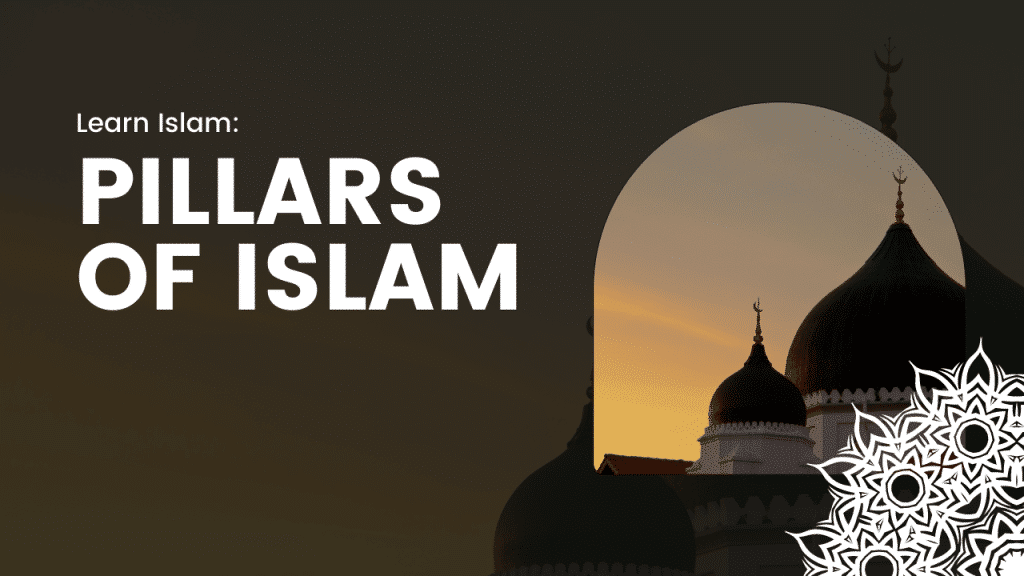The 5 pillars of Islam are five fundamental rituals that all Muslims must follow throughout their lives. These are referred to as pillars because they are the basis of Muslim life. Shahada, Salah, Zakat, Sawm, and Hajj are the five pillars of Islam.
The 5 pillars of Islam
The 5 pillars of Islam practice include:
- The proclamation of religion “shahada.”
- Prayer “salah”
- Alms-giving “zakat”
- Fasting “sawm”
- The journey “hajj.”
Muslims across the globe accept them regardless of regional, ethnic or religious distinctions.
All followers who are serious about the Prophet Muhammad, Male, and Female, Sunni and Shi’a, are required to follow the pillars of Islam.
But, it doesn’t mean that every Muslim person is doing it regularly.
Like they do in every religion, the circumstances change, and specific individuals are more committed than others.
Age or stage of life, the obligations of family members, and health and money all play a role.
What are the 5 pillars of Islam?
The main principles and rituals of Islam are referred to as the Five Pillars:
The Faith Profession “shahada.”
Islam is founded on the belief that “there is no deity but God, and Muhammad is God’s Messenger.”
This Arabic phrase is often found in the world of architecture and on a range of other things, such as:
The Qur’an is Islam’s holy book that contains divine messages.
When one confidently says this, one is an Islamic Muslim.
The 5 pillars of Islam: A prayer is a powerful tool (salat)
Muslims are believed to pray 5 times each day, in the direction of Mecca during the morning, midday, and mid-afternoon, at sunset, and then after darkness.
The chapter that begins the first (sura) in the Qur’an is said during prayers and is often performed on a small mat or rug designed explicitly for this reason.
Muslims can worship alone in any place or at a mosque, where the congregation is led by an imam (prayer leader).
On Fridays, males gather in the mosque for midday prayer. Women are also welcome, but they are not obliged to go.
After the prayer, the imam prays and discusses a topic of religious significance in a sermon that is inspired by a verse in the Qur’an.
Alms are a type of charity (Zakat)
Muslims are legally required to comply with Islamic law to give the specified amount of their earnings to those in need within the community.
Many monarchs (rulers) and wealthy Muslims construct mosques, water fountains, hospitals, schools, and other facilities as a religious obligation and ensure the rewards connected with charitable giving.
Fasting is a type of dietary restriction “Sawm.”
All healthy adult Muslims should refrain from drinking and eating during the daytime hours of Ramadan, which is the 9th month in the Islamic calendar.
They refresh their awareness of, and thankfulness for all God has offered in their life, including the Qur’an, which was revealed for the first time during this month.
They share the hunger and thirst of the poor throughout Ramadan to remind the Islamic responsibility to support those who are less fortunate.
The 5 pillars of Islam: A pilgrimage (Hajj)
If their health and resources permit, every Muslim must pay at least one visit to Mecca, in day Saudi Arabia.
The Ka’ba, a cubical construction with black embroidered hangers, is situated in the middle of Mecca’s Haram Mosque.
Muslims consider it the house Abraham (Ibrahim in Arabic) built to serve God and pray in front of the structure (qibla).
On the eighth and twelfth days of the Islamic calendar’s final month, believers from all over the globe have assembled around the Ka’ba in Mecca since the Prophet Muhammad.
What is the significance of Islam’s five pillars?
Each of the 5 pillars of Islam works together to communicate what is the essence of Islam as an ideal religion for respect and peace to Allah SWT into each Muslim’s daily life:
Monotheism and the faith of Muhammad (peace be on his name) as God’s ultimate messenger are the fundamental doctrines of Islam and the repetition of prayers such as:
The Shahada (shahadah) during prayers every day is an excellent way to practice to be reminded by Muslims of their fundamental belief.
Salah (salat) Salat (salat) is practiced five times per day and gives five opportunities to think of Allah SWT and strive in life to honor Him.
For some time each day during Ramadan, every Muslim is required to refrain from their most basic wants and desires, such as food, drink, and sexual interactions.
Each year every year, the Sawm gives Muslims to take control of their fundamental human necessities.
Muslims could instead focus on their conduct and closeness to Allah SWT without the distractions.
As Sadaqah (charity) will be encouraged to be an element of daily Muslim living, the Zakat (alms) is required at least once each year to ensure money is constantly distributed to the people in dire need.
Muslims are required to wear the same simple clothes and perform the same traditional rituals of worship in the name of Allah at the time of The Hajj (pilgrimage).
The world is reminded that we are all equal before God and are stripped of physical distinctions.
Conclusion: The 5 pillars of Islam
The 5 pillars of Islam are broken down into five categories.
Fulfilling
The 5 pillars of Islam do not have to be done in any particular sequence, as they all hold equal weight.
Whether daily, yearly, or once in a lifetime, they each have their own set of hours, places, and rules.
Each pillar and what it contains must be committed to throughout one’s life by a Muslim.
Each pillar also considers people who may be unable to fulfill one or more of them, for example, owing to illness, menstruation or pregnancy, or a lack of financial resources, among other things.
Carrying out these responsibilities creates a framework for a Muslim’s life, tying their daily actions and beliefs together in a single fabric of religious devotion.
No matter how serious one’s beliefs may be, Islam deems it fruitless to live life without putting religion into action and practice.
Carrying out the 5 pillars of Islam reveals that the Muslims prioritize their faith rather than attempting to fit it into their secular lives.
Please read the last lines and read them carefully to discover the most important things related to the five pillars of Islam.
Read More: #5 Five Pillars of Islam | Get 3 FREE trial Quran Classes




